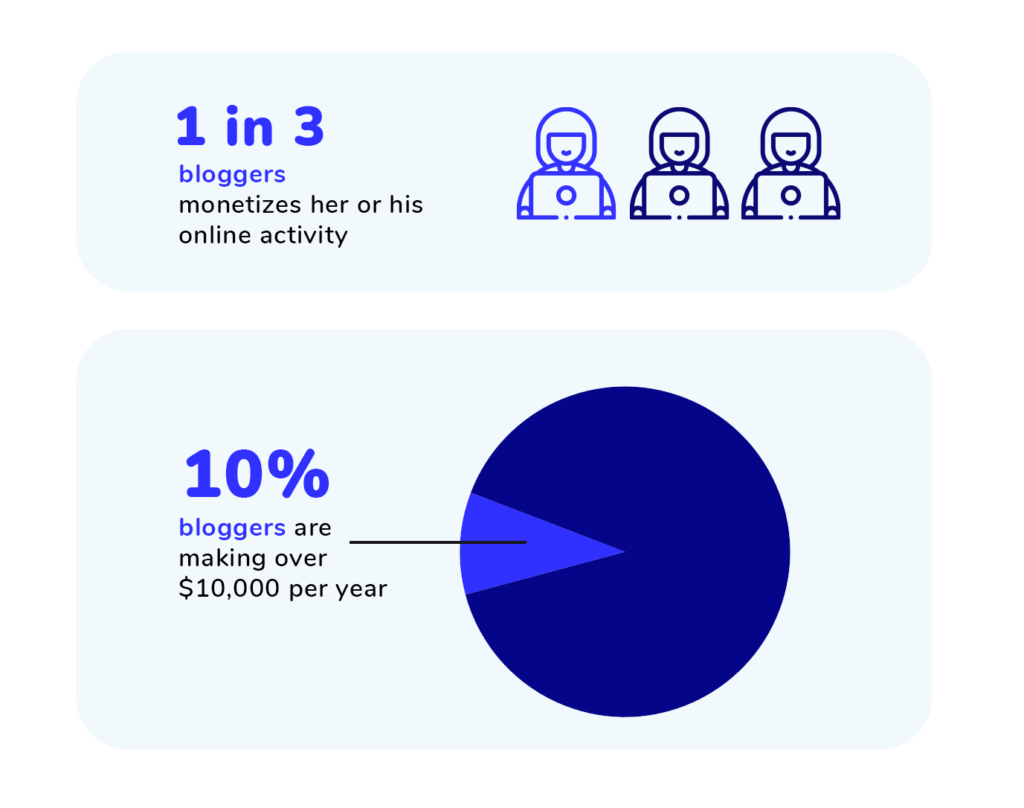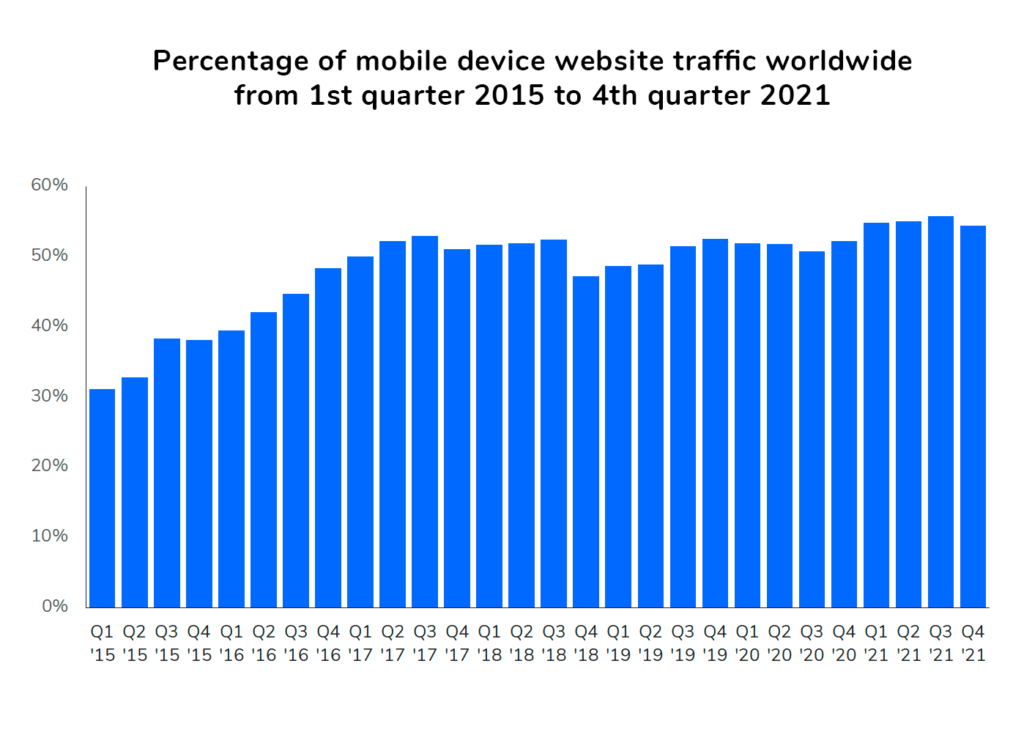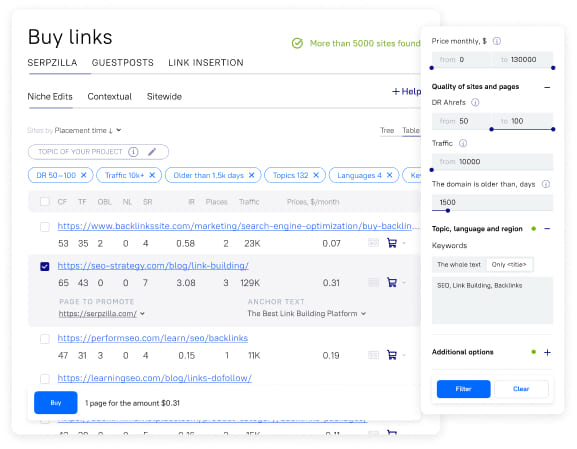Use cases for Search Engine Optimization may be evident for digital marketers alike – we all want our products and services to be visible. This is essential to the success of our online business. Yet, for bloggers, SEO efforts may seem in vain. If people already arrive on a platform, will this then not provide enough visibility? However, it’s important to think of SEO like a compass, helping you to guide your content through the vast expanse of the digital landscape, ensuring it stands out prominently. In essence, blog SEO encompasses a set of strategies and practices aimed at enhancing the visibility and ranking of your blog posts on search engine platforms – in this sense, we usually tend to talk about Google, as they are the king of search engines.
According to Seomator, 600 million blogs exist on the internet. Thus, the question of visibility becomes crucial. Every day, millions upon millions of searches are conducted using Google alone – all users arrive seeking answers to their queries, solutions to their problems, or with specific intent. Amongst this vast jungle of content, your blog post’s chances of being discovered organically, without proper SEO optimization, are zero to none. This is where lies the significance of SEO in blogging – it’s the key to unlocking the door to a wider audience, driving traffic to your website, and ultimately achieving your website’s goals, be it through boosting brand credibility, generating leads, or fostering engagement.
Further, with the digital sphere becoming more and more competitive, relying solely on the quality of your content is no longer sufficient. Whilst valuable content is a key component of online success, it stands fruitless without sufficient SEO optimization. However, this is a chance for success. According to Seomator, one in three bloggers monetizes her or his online activity, and about 10% are making over $10,000 per year.

In essence, blog SEO is not just a desirable add-on to your content creation strategy; it’s a fundamental necessity in today’s digital age of success. This blog offers a comprehensive guide into elevating your blogging game and maximizing your online presence, mastering the nuances of blog SEO is undoubtedly key to success.
Keyword Research for SEO Blog Posts
Keyword research is the cornerstone of effective SEO for blog posts. It’s the compass that guides your content creation strategy, helping you understand what your audience is searching for and how you can tailor your posts to meet their needs. Here’s why keyword research is essential:
Effective keyword research is essential in crafting an effective SEO strategy for blog posts. Think of this as the compass that guides your content creation strategy, helping you to understand what your audience is searching for. It can also help you to tailor your posts to meet their needs. Here’s why keyword research is essential:
1. Understanding Intent: through conducting thorough keyword research, you gain insight into specific phrases and words that your target audience is using when conducting their search. This understanding allows you to fully align your content with their search intent, making sure that your blog posts address their questions and concerns effectively.
2. Improving Visibility: By targeting relevant keywords in your blog posts, you can increase the chances of your content appearing upwards in search engine results pages, specifically when users input those keywords. This improves the visibility of your blog and can attract organic traffic to your site.
3. Being Above Competition: Keyword research not only helps you identify popular search terms but also allows you to assess the level of competition for those keywords. By targeting less competitive keywords with a higher search volume, you can move beyond competitors and secure a higher ranking within search results.
4. Optimizing Content: Focus on integrating target keywords naturally into your blog posts allows search engines to fully understand the context of your content. This optimization strategy signals to search engines that your posts are of value and authoritative, which may result in higher rankings.
5. Driving Qualified Traffic: Through targeting specific keywords related to your niche, you will be able to attract visitors that are genuinely engaged or interested in your content. As this will likely be targeted traffic, it is more likely to engage with your audience’s desire for blog posts, leading to a higher conversion rate and more loyal audience.
Conclusively, keyword research is the basis upon which successful SEO blog posts are created. By identifying and targeting the correct keywords, you can enhance your blog’s visibility, attract relevant traffic, and overall achieve your digital marketing goals.
Writing for SEO: Crafting Blog Posts That Rank
Crafting blogs with SEO in mind requires a strategic approach that goes beyond just producing great content. A whopping 72% of online marketers describe their content creation as their most effective SEO tactic. But what else is there?
Here’s our quick guide to crafting blog posts that rank well in Google results, focusing on both structuring posts and effectively using keywords:
1. Start with Keyword Research: Before you begin writing, embark on thorough keyword research to identify terms and phrases that your target audience is looking for. Choose primary and secondary keywords that have a high search volume and easy competition.
2. Create Compelling Titles: Your blog post titles should be enticing, descriptive, and include all of your primary keywords. Focus on titles that catch readers’ interest while also indicating the content of the post. Incorporating things like numbers, questions, or power words can increase click-through rates.
3. Optimize Meta Descriptions: Meta descriptions are the short blurbs that appear below the title within search engine results. Be sure to use this space wisely by including your primary keyword and a call to action. This will encourage users to click through to your bog.
4. Structure Your Content: Carefully organize your blog posts into sections with clear subheadings. This not only improves readability but also helps search engines understand the structure and relevance of your content. Use H2 and H3 tags for subheadings to signal the level of information.
5. Focus on Readability: Always write in a clear, concise manner that is easy for readers to understand. Use short paragraphs, bullet points, and numbered lists to break up text and make it more easily scannable. Incorporate multimedia elements like images, videos, and infographics to further enhance engagement.
6. Use Keywords Naturally: Fully blend in your target keywords throughout your blog post. However, avoid keyword stuffing. Use them in the title, headings, meta description, introduction, conclusion, and naturally throughout the body of the content. Focus on creating valuable, informative content that naturally incorporates keywords.
7. Include Internal and External Links: Add links to relevant pages within your own website (internal links) and credible external sources (external links) to provide additional context and credibility to your content. This helps search engines understand the topic of your blog post and improves overall SEO.
8. Optimize Images: Use easily understandable file names and alt tags for images to improve accessibility and provide additional context for search engines. Optimized images can also appear in image search results, pushing more traffic to your site.
Enhancing Technical SEO
While writing high-quality content and incorporating relevant keywords are crucial aspects of SEO, not fully focusing on the technical optimization can push back your blog’s performance in search engine results. Here are a few essential techniques to enhance technical SEO for your blog:
1. Optimize Site Speed: Ensure that your blog loads quickly – not just on desktop, but on mobile as well. Compress images, minimize CSS and JavaScript files, and utilize browser caching to improve site speed. Faster loading times not only enhance user experience but also positively impact search engine rankings as Google understands users are spending more time on your page.
2. Mobile-Friendliness: With the majority of internet users accessing content via mobile devices, it is now absolutely essential to have a responsive design that adapts seamlessly to different screen sizes. Google prioritizes mobile-friendly websites in its search results, so optimizing for mobile is essential for SEO success.

3. Schema Markup: Utilize schema markup to provide search engines with additional context about your content. This structured data markup helps search engines to understand the content of your blog posts in a clearer sense, potentially leading to enhanced visibility in rich snippets and throughout other SERP features.
4. Fix Crawl Errors: Proactively monitor your site for crawl errors using tools like Google Search Console. By addressing any issues such as broken links, duplicate content, or missing meta tags promptly, you ensure that search engine crawlers can openly access and index your content efficiently.
6. Secure Your Site with HTTPS: Switching to HTTPS ensures encrypted data transmitted between your website and users’ browsers, enhancing security and trust. Google considers HTTPS a ranking signal, so migrating to a more secure protocol can impact your blog’s SEO performance.
Link Building: Boosting Your Blog’s SEO Through Backlinks
Even for blog creators, link building serves as a foundational component of SEO that involves acquiring links from authoritative websites to your own. These not only drive direct referral traffic to your blog but can also play a crucial role in determining your website’s authority and credibility for search engine providers. Throughout this section, let’s explore strategies for post-SEO optimization, understanding the role of backlinks:
1. Create High-Quality Content:
The foundation of any successful link building strategy is high-quality content. By consistently producing valuable, informative, and engaging blog posts, you increase the likelihood of attracting natural backlinks from other websites. Focus on creating content that addresses common pain points, provides unique insights, or offers actionable advice to your target audience.
2. Guest Blogging: Though mentioned several times by Serpzilla in previous blogs, guest posting involves the process of writing and publishing articles within other websites in your niche, usually with them providing a backlink to your own website. Look for high authority, credible sites to contribute to.
3. Engage in Content Promotion: Focus on actively promoting your blog posts on social media and within online communities like niche relevant forums. Through sharing your content with relevant communities, you can increase the chances of it being discovered and shared by others.
4. Utilize Services for Backlinks: At Serpzilla, we provide a leading platform for acquiring high-quality backlinks from credible, high-authority websites. By leveraging our link repository of over one billion backlinks, you can secure power links that enhance your blog’s authority and improve rankings. With our own backlink analysis tools, you can choose from a variety of subscription packages that offer maximum ROI – only paying for what you use.
5. Monitor and Analyze Backlink Profile: Use tools like Moz and Ahrefs to regularly monitor your blog’s backlink profile. Use these to identify low-quality of spammy backlinks and disavow them to prevent any negative impact to your SEO profile.
By implementing these strategies and using platforms like Serpzilla for backlink acquisition, you can boost your blog’s authority, increase its visibility in search engine results, and ultimately drive more organic traffic to your website.
Blog SEO Tips: Advanced Techniques for Seasoned Bloggers
For the more seasoned SEO experts and bloggers that are looking to elevate their SEO game even further, consider utilizing thematic blocks between posts. These block groups related content together, which enhances user engagement and signals topical relevance to search engines. Additionally, experiment with scheme markup to provide Google with a better context about your content. These techniques can help you stand out in search results and drive organic traffic to your blog.

Drawing Conclusions on Blogging for SEO
As SEO marketing evolves, its influence on the world of blogging continues to have a deep impact. Staying ahead of SEO marketing blogging trends is key for sustained success. As search engine algorithms advance, bloggers must adapt their strategies to remain both visible and relevant. Be sure to embrace trends like voice search optimization, mobile-first strategies, and new improvements in AI driven technology to offer a competitive edge. By prioritizing SEO in blogging, creators can navigate the digital landscape effectively, attract organic traffic, and achieve their content goals in the ever-evolving online ecosystem.








